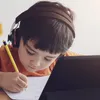How closing of preschools due to COVID-19 crisis is affecting children’s socio-emotional skills
The COVID-19 pandemic has majorly affected the education system across the globe, including parents and teachers, where everyone is making their way to ensure best practices for their students and children.

COVID-19 has been perceived worldwide as a significant threat to health and a risk to the global economy, affecting people’s lives, everyday behaviour, and often triggering intense fear.
It has led to the closure of schools in every country across the world, putting approximately 1.5 billion children and youth out of schools.
Children are not indifferent to the tremendous impact of the pandemic. They experience fears, uncertainties, and physical and social isolation, and may fail to see the school for an extended period. Government entities worldwide have taken considerate actions to roll out remote learning through various channels to reach children at home, and make smart investments to support children's education in new innovative ways.
Never before a crisis of this nature has been felt by families around the world: homeschooling is not only a massive disruption to parents’ productivity, but it is also affecting children's social life and learning.
As the global COVID-19 pandemic continues to unfurl, the development of young children could not stop. It has majorly affected the education system across the globe, including parents and teachers, where everyone is making their way to ensure best practices for their students and children.
Most importantly, the lockdown has not only affected internal assessments of the preschool, but it has changed the whole backend operations too. Everything is running online, including IT operations, curriculum activities, and teaching, to ensure appropriate learning for their children and engage them in curriculum activities.
Evaluation
Perhaps to the disappointment of the issue, children have not generally been sent to play at their homes. The idea was that they continue their education at home, in the hope of not missing out too much.
Teaching has moved online on an unprecedented level, and student evaluations are also moving online, with much uncertainty for everyone. Many curriculum strategies have been revoked, reworked, and reintroduced in many different ways. A lot of admin work also cancelled, which was supposed to happen before the beginning of the new session
Development on children’s socio-emotional skills
Families play an essential role in education, and have agreed to provide significant inputs into a child's learning. Parents are being well guided by the schools to manage the situation, and talk about the coronavirus with their children.
Today’s scenario has made it the responsibility of every teacher and parent to sustain and utilise time in a better way. Planning is the key to this lockdown. Today’s curriculum across preschools is more about engaging and developing a child’s mental, physical, and emotional growth.
Use of technology and special programmes
Preschool children are too young to handle laptops or tablets or mobile phones to be available for the online session. Schools across have started special programmes for parents to ensure no stone is unturned in the child's development, even during the current pandemic.
Training for curriculum activities
Train the trainer is another big challenge, which has been overcome in no time considering the mode of teaching has changed. Teachers have been well trained now for the online designed curriculum and how classroom lesson plans get converted into a digital lesson plan.
The curriculum at schools are now planned in a way that some are student-led, some teacher-led, and some are parents led. Both parents and teachers are working together to develop life skills in the child, like rolling towels, helping in-home chaos, storytelling, flameless cooking, theme-based storytelling, and yoga.
For the first time, even teachers are coming in front of the camera, or we can say parents are inside the classroom. Everyone is working harder than on regular days.
Stay connected with the parents
The unique nature of the pandemic has placed the parents as the forefront responders for children's survival, care, peace, and learning.
Therefore, efforts to enhance the skills of young children need to start by reaching parents along with encouragement and practical thoughts, actionable ideas to support their children in this time of crisis.
All these measures are focussed on supporting the child to get through this difficult time. The effect of this outbreak is unclear at present, as the situation is rapidly evolving.
We believe enriching environment nurtures the child. The schools are closed, but learning is going on. Approximately 80 percent of the brain develops at the age of six years. We realise the importance of this period and are trying our best to reach every child with the most excellent research-based activities because 'Each Child Matters’.
Edited by Megha Reddy
(Disclaimer: The views and opinions expressed in this article are those of the author and do not necessarily reflect the views of YourStory.)








